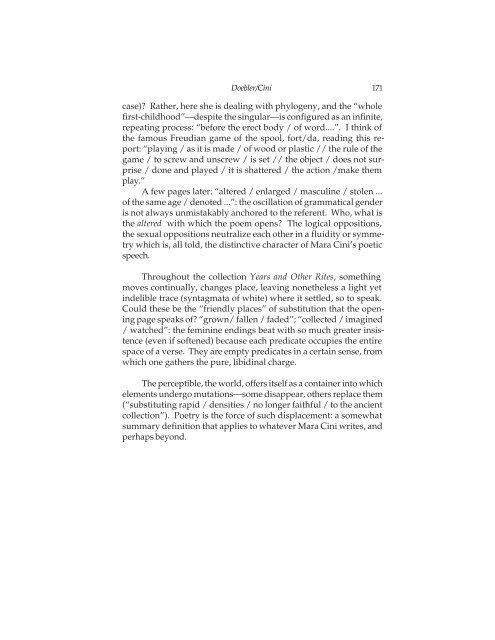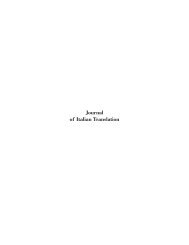Journal of Italian Translation - Brooklyn College - Academic Home ...
Journal of Italian Translation - Brooklyn College - Academic Home ...
Journal of Italian Translation - Brooklyn College - Academic Home ...
You also want an ePaper? Increase the reach of your titles
YUMPU automatically turns print PDFs into web optimized ePapers that Google loves.
Doebler/Cini 171<br />
case)? Rather, here she is dealing with phylogeny, and the “whole<br />
first-childhood”—despite the singular—is configured as an infinite,<br />
repeating process: “before the erect body / <strong>of</strong> word....”. I think <strong>of</strong><br />
the famous Freudian game <strong>of</strong> the spool, fort/da, reading this report:<br />
“playing / as it is made / <strong>of</strong> wood or plastic // the rule <strong>of</strong> the<br />
game / to screw and unscrew / is set // the object / does not surprise<br />
/ done and played / it is shattered / the action /make them<br />
play.”<br />
A few pages later: “altered / enlarged / masculine / stolen ...<br />
<strong>of</strong> the same age / denoted ...”: the oscillation <strong>of</strong> grammatical gender<br />
is not always unmistakably anchored to the referent. Who, what is<br />
the altered with which the poem opens? The logical oppositions,<br />
the sexual oppositions neutralize each other in a fluidity or symmetry<br />
which is, all told, the distinctive character <strong>of</strong> Mara Cini’s poetic<br />
speech.<br />
Throughout the collection Years and Other Rites, something<br />
moves continually, changes place, leaving nonetheless a light yet<br />
indelible trace (syntagmata <strong>of</strong> white) where it settled, so to speak.<br />
Could these be the “friendly places” <strong>of</strong> substitution that the opening<br />
page speaks <strong>of</strong>? “grown/ fallen / faded”; “collected / imagined<br />
/ watched”: the feminine endings beat with so much greater insistence<br />
(even if s<strong>of</strong>tened) because each predicate occupies the entire<br />
space <strong>of</strong> a verse. They are empty predicates in a certain sense, from<br />
which one gathers the pure, libidinal charge.<br />
The perceptible, the world, <strong>of</strong>fers itself as a container into which<br />
elements undergo mutations—some disappear, others replace them<br />
(“substituting rapid / densities / no longer faithful / to the ancient<br />
collection”). Poetry is the force <strong>of</strong> such displacement: a somewhat<br />
summary definition that applies to whatever Mara Cini writes, and<br />
perhaps beyond.
















